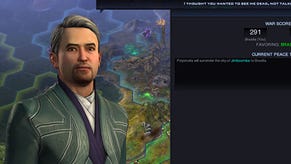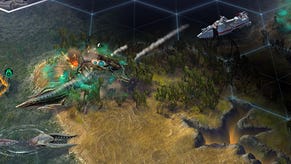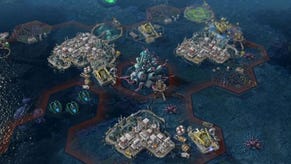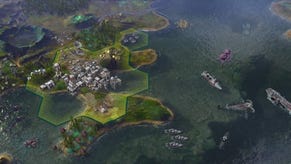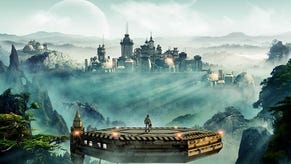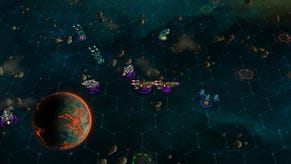Interview: Civ Beyond Earth Devs Reveal First Expansion, "Nudging The Game Further Into True Sci-Fi"
"The game is utterly different from the get-go"
'Wait for the expansion', is what RPS' feeling about Civilization's sci-fi spin-off Beyond Earth boiled down to. Well, now that expansion has been announced. Sid Meier's Civlization: Beyond Earth - Rising Tide is due for release 'this Fall', and brings water construction and combat, a revamped diplomacy system and two new factions into play. A few days ago, I had a chat with Will Miller and David McDonough, Co-Lead Designers on the turn-based strategy title, about what's planned, whether Beyond Earth was too conservative both in terms of breaking the Civ template and in its science-fiction, how war shouldn't be a surprise any more, and whether this is considered redemption.
Will Miller, left, and David McDonough, right, lead designers on Civ: Beyond Earth.
RPS: What's this doing in a nutshell, then?
Will: Rising Tide is what we like to call a Firaxis-style expansion, which means in addition to putting a lot of content into the game and balancing and polishing we also put new systems into the game which fundamentally change how it plays. If you've had Beyond Earth for a while and are interested in the expansion, this is going to be a brand new experience for you, from a gameplay perspective as well as a content perspective.
There are several features that we are very excited about. First, as the name suggests, is the addition of water-based gameplay, the ability to land cities on the water, and the new units and the aliens and the resources that come along with that. We've also completely replaced the diplomacy system from the original game with something new, which I think probably changes the game the most. I think that's the most fundamental difference under the hood.
We've added four new factions, including the Al Falah, the Arabic leader. And we've also introduced the concept of hybrid affinities.
RPS: How much of a foregone conclusion was an expansion pack for Beyond Earth? A lot of reviews - including ours, I think - predicted that expansions would make it so much better, but how reasonable an assumption was that?
Will: We have a long-term product plan at Firaxis. I can't comment on exactly what that looks like, but when we set out to make Beyond Earth the idea was to make a franchise. You're seeing us committed to that franchise, committed to that idea with this expansion, And with the patches to the base game that we released afterwards. I think it is sort of a foregone conclusion for us. This kind of echoes what happened with Civ V. We released it, it had some problems, then we patched it, we released two expansions that really brought that game up to what people know and love today. We're in the process of doing that with Beyond Earth. I think we released a very strong initial product, and we patched it based on user feedback. This expansion is a combination of David and my vision for the game, and the addition of what people wanted from the community. We built this game for our players, and we're always watching how people are playing and trying to react to that, and drive the franchise in a new and differentiated direction from Civ.
Nothing is ever certain in this business, but when we set out to make Beyond Earth we certainly hoped that it will have a long life. One of the biggest, most rewarding pieces of feedback that we got from our community was that there was a hunger for this game, for the idea that this game represents. We're delivering on that.
RPS: Is there a conscious attempt to be less conservative now?
David: Absolutely. Beyond Earth went as far as we thought that we could go. We actually talked about this at GDC, on this exact subject. We did a lot of things that we're really proud of and we think that the game is very successful one, but when it came out we were both pleased and surprised to see fans react by saying 'I wish you'd gone further, I wish there was more differentiation, more wildness.' We were like 'oh, we'd love to.' So in the expansion we've definitely taken a few stands that are way different from anything that a Civ game has attempted before, beyond what we felt we wanted to do with the base game. We're really excited by how much it changes how the game plays. Water gameplay alone - there's never been a Civ game where the whole surface of the map is playable, there's nowhere to escape. The idea of totally rebalancing the game around cities that are on water as well as on land is more than just 'oh, you have blue terrain now.' It's an entirely different strategic landscape. Every game, every decision you make is new, even the old ones. There's a lot in this game that really pushes the envelope of what BE can be and Civ can be.
RPS: Is the water building something you can do from the off, or do you have to actively pursue it in the Tech web?
David: You have a modest tech requirement, similar to Pioneering in Beyond Earth, which you had to research before you could build a Colonist. It's very achievable really quickly if you go for it. And two of the new factions - unfortunately neither of them we're revealing yet - will have special advantages to playing on the water. There's a real effort to make water gameplay part of your game from the very beginning. Even if you intended to play an entirely land-based Civ, you're still going to have understand how the water works, how to play against aquatic competitors, use the new power that water gameplay provides... It's a big deal.
RPS: Is it all on the surface of the water?
Will: It is one surface. We wanted to keep the gameplay on the map, we didn't want to make another layer that you had to drop into to see what was going on. The information is there. Our artists have done a really amazing job with the presentation of this and I cannot wait for you to get screenshots to see just how good this looks. We've rewritten our water rendering and our water shader to let you see through the surface, we've revamped how our terrain generation works and how our map generation works, to generate the terrain underneath. We have a full range of new aquatic resources for both shallow and deep water, and new expedition sites, and new things to find out there, along with a host of new aliens to contend with. So it's an entirely new space for you to play, and as David alluded to, it's not just blue terrain. There are some mechanical differences between terrestrial cities and water cities, terrestrial combat and water combat, and how growth works. We've really differentiated them without, I think, increasing the complexity too much.
RPS: If you're an experienced BE player starting your first Rising Tide campaign, what's the first thing you'll hit that'll feel significantly different?
David: Really the second you land you'll be able to see the new water. You can see the surface and the sea floor, all the new creatures and new resources. Even if you play on a map that's predominantly land it'll look different. A couple of the factions will start with major advantages on the water, so if you pick one of those your game is utterly different from the get-go. But it's impossible to ignore - everything from the units you can to build to the technologies that you first encounter and what they unlock, how you get Affinity, how you're interacting with the other leaders. The new Diplomacy system... From the very beginning the changes are in front of you.
Will: We've also introduced two new biomes. We can't really say what those are yet, but even the environment that you play in can be potentially be different. From turn 1 it's going to be a pretty different game.
RPS: How has the Diplomacy system changed, then?
David: We can't tell you too many details, but I can speak to it from a philosophical level. One of the takeaways from the base game is that the diplomacy system from Civ V, which we just brought over wholesale, didn't really work, because it relied on these characters from history. Players understood intuitively how Montezuma might behave or how Ghandi might behave. You could make strategic decisions based on prior knowledge of those characters. Because we have invented characters we wanted to provide more transparency in terms of how they behave and why they do the things they do. We wanted to make a game out of that. We also wanted the player to do more meaningful things through diplomacy. In Civ V and in Beyond Earth the outputs of diplomacy are trade and you can declare war or peace. There's actually very little that you do in diplomacy; they're important things, but there's not a lot of high frequency interaction that you have. You didn't have a lot of opportunity to interact with the leaders that we put in, their personalities didn't really get an opportunity to shine. We wanted to build a game around this idea of diplomacy, that would allow our characters to take centre stage and give the player the chance to introspect into their personalities and to give them more things to do, more benefits to be gained.
So just as an example, if I'm playing a military game but I need help researching new technologies, I can solve that problem now through the diplomacy system. I can make an agreement with another leader and in exchange for other things can now have mututal benefits, but it's a strategic choice because they get something from me too. So I have to be very careful about who's getting what.
We've also built in some new vectors about how leaders communicate with you. The system as a whole is broader, I would say. There's a lot more meat to it, there's a game to it, there's a progression to it, and it's more transparent.
RPS: It kind of felt in Beyond Earth like you had the option to steamroller everyone or you had to perpetually have something prepared in case someone suddenly lashed out at you; now will you have more sense of why that might happen, and how much does that enable a more nuanced and reactive approach?
Will: Yes, that's exactly right. The reason the AI behaves the way it does is very complicated. I think one of the problems with Beyond Earth is that the perception of motivations for the leaders was not apparent. They would do things that didn't make any sense in the context of what was happening on the map. This system is there to give you a window into what they're thinking, and to make a game out of that. One of the inspirations for that, and this may give you a little bit of a telegraph into what this looks like, is a boardgame called Tales of the Arabian Nights.Your personality as a player is this collection of cards that you get from the experiences that you have in the game. It's not exactly like that, but we loved this idea of the player having a personality that evolves, and that personality be the driving thing behind the interaction you have with them, and to put that in front in the player and let them strategise around it.
RPS: Do you mean that the player's behaviour will change over the course of the game because they feel they've built up relationships with the other factions?
Will: I'd say that that's true. I'd also say that you can use the diplomacy layer to make up for deficits. So if I need something I can get it through research, I can get it through exploration, and now I can get it through diplomacy. We've taken a lot of these benefits and spread them all out across the game, making the diplomacy important to other parts of the game, rather than just the war and peace thing. And adding this idea of progression, so the leaders that start off the game have a personality that changes over the course of the game to something different at the end, based on what's happening, based on your interactions with them, based on the map, based on a lot of factors. You can see that as a player, and you can plan around it.
RPS: Traditionally, or at least as armchair critics like me have it, Civ expansions target weaknesses in the mid game or the late game. It sounds like this one is meant to be more game-wide?
David: That's definitely true. Our game has got a different pace to it, a different arc than a traditional Civ. It tends to ramp higher and faster. In the base game we spent a lot of our effort making it play and feel different from Civ in very key ways - things like the Tech Web and the Affinity system. What we're doing in the expansion is simultaneously deepening those systems and adding more content and more variety, more opportunity for player personalisation and for them to control the way the game goes. But also things like the diplomacy and the water system are relevant no matter how big or how small your game is, or how early or how later. There are things that are going to change every decision that you make, in big and little ways. There are also things that scale with the player's interests. You can invest in the diplomacy to whatever extent that you feel you need to. It'll be rewarding whether it's a 1v1 game or a 1v10. Likewise, the water gameplay, even if you play on a map that's one little ocean or one that's entirely water, it's still a big deal, one that changes the strategic landscape. I think it's accurate to say the changes that we're after in this game are consistent throughout all the phases of it, they're meant to turn up the stakes on every part.
RPS: Has your approach to science fiction changed? Despite having human-alien hybrids, it was kind of buttoned down in the base game. How much is the wildness restrained by a theoretical science mindset?
David: I think we do both, actually. I think there are a lot of new additions which are very much plausible science, real world-inspired things. There are a lot of ideas in the dipomacy which are based on real, modern politics, there's a lot of aspects of the new factions that are drawn from the same real-world sources that the existing ones are. The new units, like we've introduced the submarine, which is a unit that everyone already understands, but the Hybrid Affinity unique units are much wilder, they're more bizarre than the Purity ones were. The naval alien catalogue has been expanded, so that feels even more alien, more of a strange environment, than it used to be. And then little things like the new biomes and adjustments to the victory conditions... In many, many small ways we are nudging the game further into true sci-fi. We're letting it progress there. There's a number of pieces of new content or new features which are much more strange, much more space than BE had.
RPS: Internally, how much sense is there that you have to redeem Beyond Earth?
Will: Every product is iterative with us. I think our audience, and rightfully so, has a pretty short memory. When Civ V came out it was pretty rough and it took two expansions to get that game to the place that people have in their heads. The game that people have in their heads is the result of lots of patches, lots of iteration and two expansions. Beyond Earth is no different. When you make a complex strategy game or you iterate on a franchise like Civ you have to watch how people play, you have to see what people do with the game, and you have to respond. We've done that with the patches that we've released and the Rising Tide expansion is an indication of our committment to this as a franchise. We're growing this idea and improving and expanding upon it. We're not a studio that releases one-and-done products. We're always watching and always improving.
RPS: Thanks for your time.
Rising Tide is due for release this fall/Autumn and will cost £19.99.









